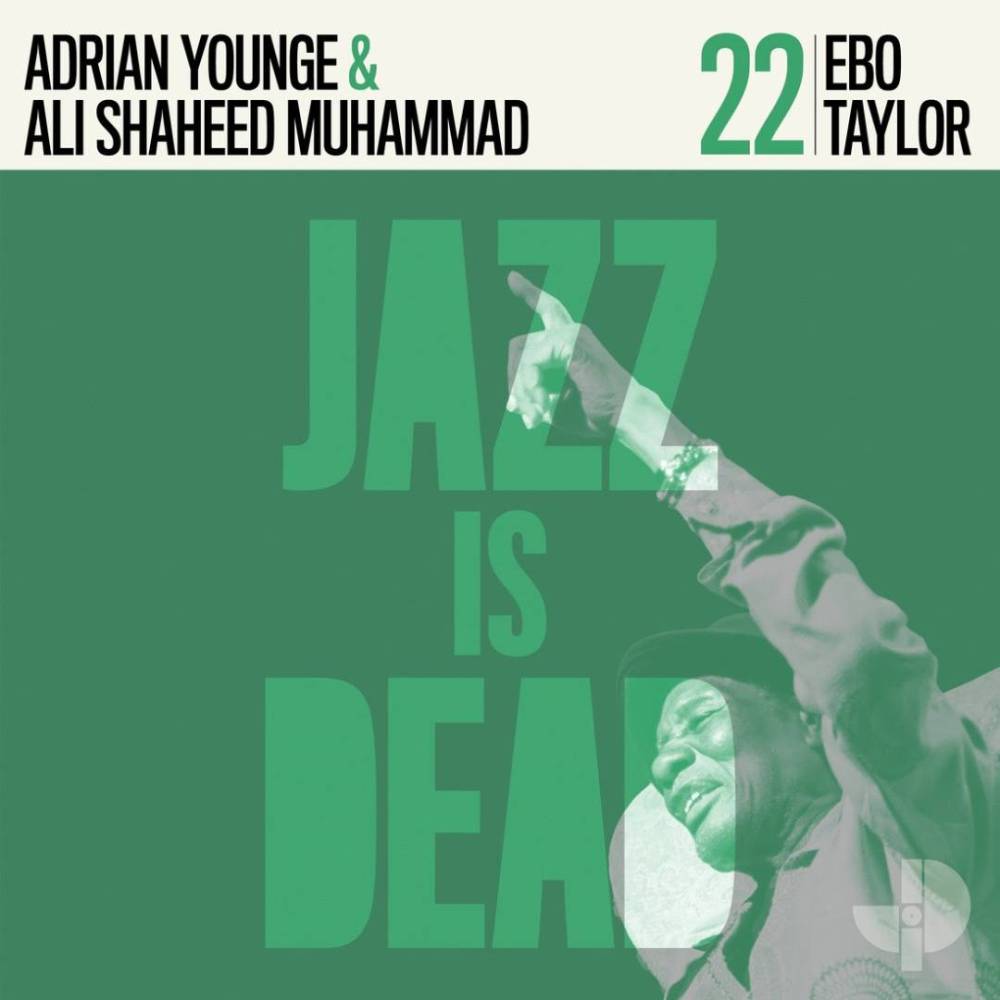Album Cover via Riot Act Media
Mexican music never sleeps, and neither does Leonel.
“Rhythms live inside people naturally. The instinctive feeling then pushes you to learn from the experiences of people around you,” said Ebo Taylor at our recent interview, about the cultural exchange that took place during the making of Ebo Taylor JID022, the latest installment of the already iconic Jazz is Dead series, in which founders Adrian Younge and Ali Shaheed Muhammad join forces with the legendary Ghanaian artist, his son Henry—a brilliant musician in his own right—and an assortment of international players.
Through his numerous contributions to music and the popular culture in his native Ghana and beyond its borders, and his distinctive way of incorporating the diverse rhythmic traditions of peoples such as the Ga, Ewe, Dagomba and Akan (his own) into his compositions, the great Ebo Taylor can be argued to be the greatest rhythm guitarist in history. His sprawling rhythmic sense and indomitable spirit remain intact, even at 90 years old and no longer able to play his guitar.
Taylor’s body of work is defined by the opening groove, and how he can set a mood from the very first note. From the opening organ riff of “Get Up,” played with the same urgency as a guitar doing clean quick upstrokes, or a dawur bell, the track immediately gets you warm and pulls you into the groove. But beyond being a celebration, the song is a call to action, as the refrain says: “Brothers, get up and do your thing,” reminding us that Ebo has been a voice for social advance and the uplifting of his people’s spirit from the very beginning, making him a heroic figure of national pride.
Ebo Taylor speaks to POW about Ghana, the spiritual element of Highlife, and more.
“Highlife music has inspired and had significant impact on the people of Ghana and beyond because of its cultural heritage, fusion, lyrical storytelling, infectious rhythms and so on. Ghanaian highlife has a rich history and its development is closely tied to the country’s cultural,social and political evolution. The music shifted because the musical roots lie in traditional folk music, with diverse styles and instruments specific to various ethnic groups such as the Akan, Ewe and Dagomba…” — Ebo Taylor
Throughout the record, the ensemble engaged in the various steps in Highlife’s evolution, from its roots in Akan blues, to its gradual absorption of jazz and even to its psychedelia-tinged period. “Obra Akyedzi” and “Obi Do Owa” show the band more deeply immersed in the eternal dialogue between Ghanaian highlife and Nigerian afrobeat, particularly in Taylor’s close relationship with Fela Kuti, where both borrowed elements from one another. This is especially noticeable in the way brass flourishes are woven into the pockets of the groove and in the handling of space within the production. In Kusi Na Sibo, a standout track driven by Muhammad’s thick basslines, the influence of older rhythmic patterns—such as palm-wine, osibisaaba and Akan traditional styles, passed down through generations of tunes—is even more evident.
“I will always say that music is spiritual, it has been an integral part of human culture for centuries. Music transcends words and linguistic barriers, evolving emotions and connecting people across cultures and beliefs. I always seek the direction of my maker” — Ebo Taylor
Slower pieces like “Nsa a w’oanye edwuma Odzidzi” and “Feeling,” penetrate the body. The songs are testament to the spiritual element of Ebo Taylor’s music.There’s an innate biological pulse that can be felt in his approach to leading this multigenerational group, from the moment Younge lays down his first bassline to how the horns and flute melodies appear and move as an expansive wave. Yet it is in the drum-and-conga combo where the key to its immense power resides, both here and throughout the entire album: the sinuous interplay of phrasings between the two instruments, and the sonic alchemy of Philip Andy Biney and Samson Olawe—coupled with the masterful production—lends each beat, every fragment of the tracks, a tremendous density.
Despite his age, Ebo Taylor still feels undoubtedly the head of this project; it is his voice commanding the procedures with his deep, soulful voice, which remains brimming with the same vitality as his golden years where he helped shape Ghana’s modern cultural identity with his fusion of jazz, funk, and an assortment of regional styles. Alongside his son, Henry Taylor, an impressive musician on his own right and the Fender Rhodes player throughout the record, and the giants Younge and Muhammad whose deep respect and love for his music are undeniable, he created a true testament of the proverbial “round-trip” that is highlife music; a redrawing of the grooves and sensibilities of the Mother Continent through the exchange of ancient and modern, North and South, coast to coast. This is a remarkable addition to Taylor’s already vast legacy and, hopefully, a window for new generations to gauge his figure’s era-defining significance.


